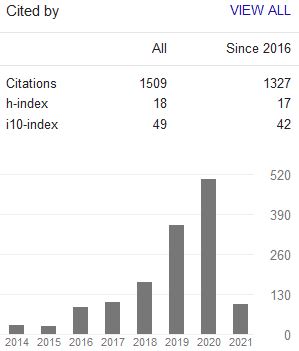K-POP FANDOM IN VEIL: Religious Reception and Adaptation to Popular Culture
Abstract
Keywords
Full Text:
PDFReferences
Alamsyah, A. and Hadize. “Three Islamist generations, one Islamic State”. Critical Asian Studies, 49, 1 (2017): pp. 54-72.
Alfian. Muhammadiyah: The Political Behavior of a Muslim Modernist Organization Under Dutch Colonialism. Yogyakarta, Indonesia: Gadjah Mada University Press, 1989.
Azumah, J. Challenging Radical Islam. New York: Research Library, 2015.
Bennett, T. and Woollacott. Bond and Beyond: the Political Career of a Popular Hero. New York: Macmillan, 1987.
Cohen, S. “Ethnography and Popular music studies”. Popular Music, 12, 2 (1993): pp. 123-138.
Couldry, N. “Mediatization or mediation”. New Media society, 10, 3 (2008): pp. 373-391
Coutas, Penelope. “Fame, Fortune, Fantasi: Indonesian Idol and the New Celebrity”. Asian Journal of Communication, 16, 4 (2006): pp. 371-392.
Davie, G. Religion in Europe. Oxford: Oxford University Press, 2000.
Dewi, Novita. “Formation of Youth Identity in Indonesian chick Lit”. K@ta, 13, 1 (2011): pp. 134-146
Emerson, R. et. al. Writing Ethnographic Field notes. Chicago: Chicago University Press, 1995.
Esposito, John L. Islam in Asia: Religion, Politics, and Society. New York: Oxford University Press, 1987.
Fealy, Greg and Sally White. Expressing Islam: Religious Life and Politics in Indonesia. Singapore: Institute of Southeast Asian Studies, 2008.
French, D. et al. “Friendship and the religiocity of Indonesian Muslim”. Journal of Youth Adolescence, 40 (2011): pp. 1623-1633
Geertz, Clifford. The interpretation of Cultures. New York: Basic Books, 1973.
Grossberg, L. “Another boring day in paradise: Rock ‘n roll and the empowerment of everyday life”. Popular Music, 4 (1984): pp. 225-258.
----------. Dancing in spite of myself. Durham, NC: Duke University Press, 1997.
Hall, Stuart. Culture, Media, Language. London: Routledge, 1980.
Hebdige, Dick. Hiding in the light. London: Comedia, 1988.
Hermes, Joke. “Media figures in identity construction”. Pertti Alasuutari (ed.). Rethinking the Media Audience. London: Sage 1999.
Hjarvard, S. “The mediatisation of religion: theorizing religion, media and social change”. Culture and Religion, 12, 2 (2011): pp. 119-135.
Interview with 18 students at Muhammadiyah II high school by calling from 1 to 18. For 7 students who are members of GOT 7 fan club, I count them from G 1 to G 7 in the citation.
Levy, Robert. Tahitians: Mind and experience in the society islands. Chicago: University of Chicago Press, 1973.
Lynch, G. “What can we learn from the mediatization of religion debate?”. Culture and Religion, 12 2 (2011): pp. 203-210.
Mail Daily Sept. 4, 2017.
Mushaben, J. Marie. “Gender, hiphop and pop-islam”. Citizenship studies, 12, 15 (2008): pp. 507-526.
Rahman, Taufiqur. “Contexualizing Jihad and mainstream Muslim identity in Indonesia”. Asian Journal of Communication (forthcoming, 2017)
Ramage, Douglas E. Politics in Indonesia: Democracy, Islam and the Ideology of Tolerance. London: Routledge, 1997.
Ricklefs, M. C. Islam in the Indonesian Social Context. Clayton, Victoria: Centre of Southeast Asian Studies, Monash University, 1991.
Siriyuvasak, Ubonrat and H. Shin. “Asianizing K-pop”. Inter-Asia Cultural Studies, 8, 1 (2007): pp. 99-136.
Siriyuvasak, Ubonrat. “Asianizing K-pop: production, consumption and identification patterns among Thai youth”. Inter-Asia Cultural Studies, 8, 1 (2007): pp. 109-136.
Strömback, J. “Mediatization and perception of media’s political influence”. Journalism Studies, 12, 14 (2011): p. 423-439.
Weintraub, A. “Dangdut Soul: Who are the people in Indonesian popular music”. Asian Journal of Communication, 16, 4 (2006): pp. 411-431.
Yoon, Sunny. “Taming the Primitive: Multiculturalism and the Anthropological Vision of South Korean Media”. Visual Anthropology, 28, 5 (2015): pp. 422-437.
---------. “Tuning in Sacred: Youth Culture and Contemporary Christian Music”. International Review of the Aesthetics and Sociology of Music, 47, 2 (2016): pp. 315-342.
DOI: 10.15642/JIIS.2019.13.1.1-20
Refbacks
- There are currently no refbacks.
Indexed by:
Journal of Indonesian Islam (ISSN 1978-6301 and E-ISSN 2355-6994) is published by the Postgraduate Program (PPs) and the Institute for the Study of Religion and Society (LSAS), State Islamic University (UIN) of Sunan Ampel Surabaya.
Journal of Indonesian Islam by http://jiis.uinsby.ac.id/index.php/JIIs/index is licensed under a Creative Commons Attribution-ShareAlike 4.0 International License.
Copyright ©2020 State Islamic University (UIN) of Sunan Ampel Surabaya. Powered by Public Knowledge Project OJS.







